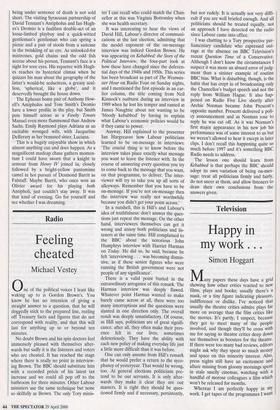Radio
Feeling cheated
Michael Vestey
0 ne of the political voices I least like waking up to is Gordon Brown's. You know he has no intention of giving a straight answer to a question, that he will doggedly stick to the prepared line, reeling off Treasury facts and figures that do not correspond with reality, and that this will last for anything up to or beyond ten minutes.
No doubt Brown and his spin doctors feel immensely pleased with themselves after- wards but sadly it is the listeners and voters who are cheated. It has reached the stage where there is really no point in interview- ing Brown. The BBC should substitute him with a recorded précis of his latest tax increase and we could all pop off to the bathroom for three minutes. Other Labour ministers use the same technique but none so skilfully as Brown. The only Tory minis- ter I can recall who could match the Chan- cellor at this was Virginia Bottomley when she was health secretary.
It was interesting to hear the views of David Hill, Labour's director of communi- cations at the last election, admitting that the model exponent of the on-message interview was indeed Gordon Brown. He was appearing on Kebabbed: the Story of the Political Interview, the four-part look at how these have changed since the deferen- tial days of the 1940s and 1950s. This series has been broadcast as part of The Westmin- ster Hour on Radio Four on Sunday nights, and I mentioned the first episode in an ear- lier column, the title coming from Neil Kinnock's outburst during an interview in 1989 when he lost his temper and ranted at James Naughtie about not wanting to be 'bloody kebabbed' by having to explain what Labour's economic policies would be if they came to power.
Anyway, Hill explained to the presenter Ian Hargreaves how Labour politicians learned to be on-message in interviews: 'The crucial thing is to know before the interview takes place exactly what message you want to leave the listener with. In the course of answering every question you try to come back to the message that you want, on that programme, to deliver. The inter- viewer will try to take you up all sorts of alleyways. Remember that you have to be on-message. If you're not on-message then the interview was really not worthwhile because you didn't get your point across.'
In a nutshell, this is Hill's and Labour's idea of truthfulness: don't answer the ques- tions just repeat the message. On the other hand, interviewers themselves can get it wrong and annoy both politicians and lis- teners at the same time. Hill complained to the BBC about the notorious John Humphrys interview with Harriet Harman on Today. He did so, he said, because he felt 'interviewing . . . was becoming dismis- sive, as if these senior figures who were running the British government were not people of any significance'.
There is a valid point buried in the extraordinary arrogance of this remark. The Harman interview was deeply flawed. Whatever point Harman wanted to make barely came across at all, there were too many interruptions and the questions were slanted in one direction only. The overall result was deeply unsatisfactory. Of course, as Hill says, politicians are of great signifi- cance; after all, they often make their pres- ence felt in our lives, sometimes deleteriously. They have the ability with each new policy of making everyday life just a little more difficult than it was before.
One can only assume from Hill's remark that he would prefer a return to the syco- phancy of yesteryear. That would be wrong, too. At general elections politicians pre- tend to be our servants. It is only after- wards they make it clear they are our masters. It is right they should be ques- tioned firmly and if necessary, persistently, but not rudely. It is actually not very diffi- cult if you are well briefed enough. And all politicians should be treated equally, not an approach I have detected on the radio since Labour came into office.
I was chatting to a Tory prospective par- liamentary candidate who expressed out- rage at the absence on BBC Television's recent Question Time of a Conservative. Although I don't know the circumstances I suspect it was more an absurd error of judg- ment than a sinister example of routine BBC bias. What is disturbing, though, is the habit that has crept in of broadcasting only the Chancellor's budget speech and not the reply from William Hague. It also hap- pened on Radio Five Live shortly after Archie Norman became John Prescott's opposite number. Prescott delivered a poli- cy announcement and as Norman rose to reply he was cut off. As it was Norman's first major appearance in his new job his performance was of some interest to us but we weren't allowed to hear it except in later clips. I don't recall this happening quite so much before 1997 and it's something BBC Radio needs to address.
The lesson one should learn from Kebabbed is that perhaps the BBC should adopt its own variation of being on-mes- sage: treat all politicians firmly and fairly, do not sneer at them, and allow listeners to draw their own conclusions from the answers given.


























































 Previous page
Previous page